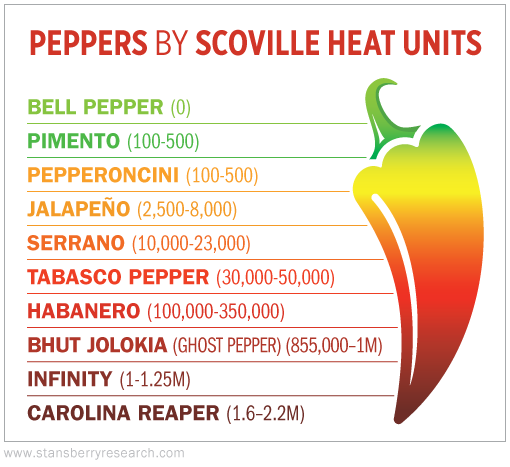It's a food that only humans enjoy...
Most animals avoid it. And the ones that do eat it – like birds – are immune to its effects.
Eat too much of it and you could experience acid reflux, seizures, heart attacks, and even death. But its health benefits are incredible.
I'm talking about hot peppers.
The chemical responsible for a pepper's hotness, capsaicin, is an irritant. All other animals avoid the unpleasant burning sensations caused by hot peppers. But humans enjoy the pain – cultures everywhere have spicy dishes.
That's because capsaicin directly interacts with a receptor on our tongues called the vanilloid receptor, or TRV 1. TRV 1 helps us regulate our body temperature. When capsaicin triggers it, your brain thinks your tongue is actually on fire.
The heat of a pepper is measured in Scoville units. The more Scoville units, the hotter the pepper.
The hottest pepper in the world – the Carolina Reaper – has more than 2 million Scoville units. To compare, Tabasco sauce has between 2,500 and 5,000.
You can search the Internet for videos of people who've taken on the challenge of eating a ghost chili – the world’s third-hottest pepper – and see similar reactions: sweating, coughing, and an overwhelming burning sensation.
That sounds awful, but the relief that comes after eating a hot pepper is what makes people enjoy it.
You see, once your brain thinks your tongue is on fire, it fires off a lot of endorphins and dopamine – feel-good chemicals that bring on a state of relief and happiness. Plus, the endorphins shut down the pain receptors from experiencing more pain. So you essentially get pain relief in the wake of that initial shock.
But peppers don't just bring happiness and pain relief. Several areas of study have shown promising results that capsaicin could help you live longer and even prevent cancer.
Last fall, researchers at the Chinese Academy of Medical Sciences made headlines with their new study. Reporters detailed it as "eating spicy foods increases lifespan."
Their study looked mostly promising. Close to half a million adults, aged 30 to 79, responded to food surveys for a period of seven years. Those who ate spicy foods six or seven times a week had a 14% lower risk of mortality during the study than those who ate spicy meals once a week or less.
Spice, in this case, was a measure of chili – fresh chilies, chili flakes, and chili oil.
Of course, there are some considerations for this study – so don't run out and buy a bushel of ghost chilies just yet.
First, the Chinese population consumes peppers far more than many other countries. In fact, the study says up front that chili peppers are one of the most popular foods in the nation. That could skew some of the results.
And as Alice Lichtenstein of Tufts University points out, people in good health may enjoy a wider variety of foods, including spicier dishes.
Even though this is an association study instead of a cause-and-effect, we think there's truth to the overall health claims.
For instance, we know that capsaicin interacts with not just TRV 1, but also with a protein called "nuclear factor kappa-light-chain-enhancer of activated B cells" or NF-kB for short. NF-kB helps us regulate our immune systems. It signals our cells to respond to threats like bacteria, viruses, and stress.
However, sometimes NF-kB won't shut off. This causes certain cells to grow and divide rapidly, causing cancer. It also leads to an overabundance of inflammation, which damages our cells and causes a host of problems. Capsaicin goes in and blocks NF-kB's path, meaning it helps reduce inflammation and the possibility of tumor growth.
In fact, a new study from the Journal of Cancer Prevention indicates that capsaicin could provide protection from breast cancer.
Longtime readers of my monthly newsletter, Retirement Millionaire, might remember I recommended capsaicin in the past. It improves mood and helps with weight loss.
There's also a study from Purdue University that showed people who either regularly consumed red chili peppers, or started eating them, had reductions in appetite and burned more calories after eating.
Even more interesting, the participants who started using cayenne powder during the study found they had fewer cravings for sweet, salty, and fatty foods.
The research keeps coming, and makes us more and more interested in hot peppers. One day soon, we'll be saying "a pepper a day keeps the doctor away."
In the meantime, do what I do and try adding a bit more spice to your diet. I enjoy red pepper flakes in a bowl of chili and I'll eat jalapenos (without seeds) on sandwiches.
What's the hottest food you've ever tried? Let us know here.
- Brave or masochistic – one writer tries 11 of the spiciest dishes in his city in one afternoon.
- Something different: a new study finds an average of 100 species of bugs in the average American household.
[optin_form id="286"]

